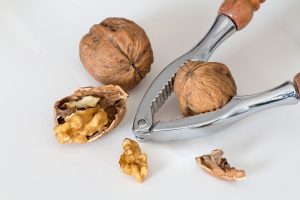A huge number of studies are finding that nuts are one of the most health-giving foods on the planet. And while the research is new – nuts aren’t.
In fact, a recent archeological dig in Israel found evidence that nuts formed a major part of our ancestor’s diet 780,000 years ago. Dig researchers discovered seven varieties of nuts, along with stone tools to crack them open. These stone tools, called “nutting stones,” are similar to those found in the United States and Europe which archeologists date back 4,000 to 8,000 years.
Today, many of us enjoy walnuts, almonds, pecans, Brazil nuts, pistachios, cashews, macadamia nuts, and hazelnuts, plus an honorary nut we call peanuts (even though peanuts are technically a legume) with enthusiasm.
Yet we are only beginning to appreciate the enormous nutritional benefits that nuts give us. They are rich in high-quality protein, fiber, minerals, tocopherols, phytosterols, vitamin E, vitamin B6, folate, and phenolic compounds. Epidemiologic studies have linked nut consumption with reduced rates of heart disease and gallstones, as well as beneficial effects on hypertension, cancer, and inflammation. Recent studies have also indicated that nut consumption can help to prevent type 2 diabetes.
A study of Seventh-Day Adventists (a religious denomination that emphasizes healthy living and a vegetarian diet) found that those who ate nuts at least 5 times per week gained, on average, an extra two years of life expectancy. The nut eaters also experienced a 50% reduction in heart disease risk.
Another large-scale, 30-year long study found that people who regularly ate one ounce of nuts at least seven times per week were 20 percent less likely to die for any reason, compared to those who avoided nuts in their diet.
Many nuts have also been linked to lower rates of certain cancers. Studies done on walnuts, in particular, have found that they appear to be particularly protective against breast and prostate cancers.
Walnuts and many other nuts contain a number of potent nutrients that can help fight cancer and boost overall health. These include ellagic acid, a phytochemical antioxidant, and gamma-tocopherol, a type of vitamin E – both of which have strong anti-inflammatory and cancer-protective effects.
And a clinical study published in the International Journal of Impotence Research looked at what happened to men with erectile dysfunction who ate three to four handfuls of pistachios a day for three weeks. They experienced a significant improvement in blood flow through their private parts. The researchers concluded that three weeks of pistachios “resulted in a significant improvement in erectile function…without any side effects.”
Enjoy Nuts
Based on numerous studies, it appears that eating 1-2 ounces of nuts 5 days or more per week leads to tremendous health benefits. You can enjoy nuts straight, with a sprinkling of salt, in a trail mix, in a nut loaf or casserole, blended into “nut milks”, added to smoothies, or prepared into nut “cheeses” or even pie crusts.

With walnuts, because of their high omega 3 fatty acid content, fresh is best. You can get a nutcracker and crack them yourself, or you can get them already shelled, in which case it’s best to either eat them soon after purchase or to store them in the refrigerator (not the freezer). Nuts of all kinds can make a great healthy snack to munch on at just about any time of the day.
